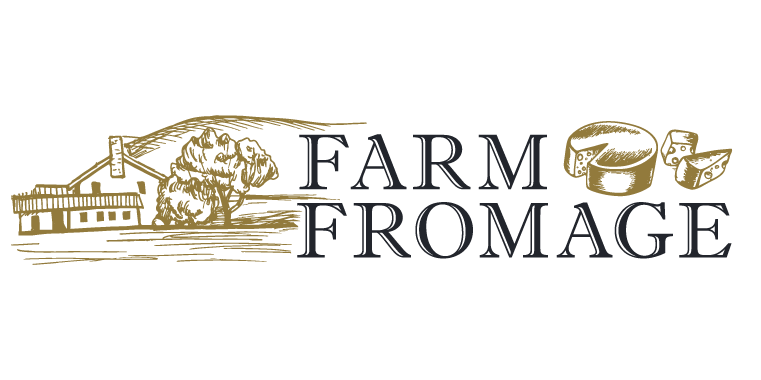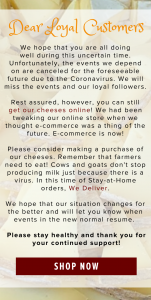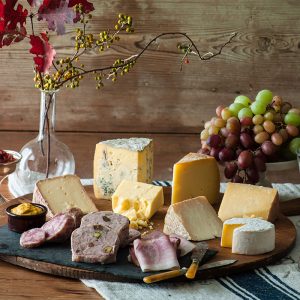By Alex Wenger
Farm Fromage Sells Farmers’ Artisan Cheeses
LANCASTER, Pa. — Howard Field’s passion for cheese began long before he started Farm Fromage, an artisan cheese distribution company.
But when he did decide to switch from amateur cheese-maker to professional, the change was swift and the growth of the business rapid.
Laughing, Field recalled the day — Aug. 6, 2010 — when he left his job in marketing at 9 a.m. and “decided to start a cheese company at 11 o’clock that same morning.”
He said Farm Fromage was born out of his desire to help small dairy farmers faced with the challenge of low milk prices. The company’s mission is to help more farmers stay on the farm.
“The way we do that is by working with the farmer and the dairyman to create artisan cheeses and then sell it,” Field said. “And we are in the process of developing a market that should be able to provide anybody who wants to get into the cheese business and make wonderful artisanal cheeses a ready market.”
Farm Fromage has grown quickly over the past year, and recently its brand was picked up by two national distributors.
Field describes how his search for milk led him to Amos Miller, a Lancaster County cheese-maker and owner of Misty Creek Goat Dairy.
Field was impressed by the quality of Miller’s cheeses but soon realized that marketing was a challenge for Miller.
The two began working together, Miller making the cheese and Field marketing it to buyers who would pay the price Miller needed to stay profitable.
“By constant knocking on doors and making (artisan cheese) available, we’ve grown very quickly, to the point of really being excited about the future here,” Field said.
Farm Fromage’s clientele includes farmers markets and “fine food” restaurants in Lancaster, Philadelphia, Washington and as far away as San Francisco.
Ironically, the chain of events that led Farm Fromage to its largest customers happened not in Philadelphia or Washington, but at the weekly farmers market in Millersville, Pa.
“From small things, good things happen,” Field said. “A lady would come every week and purchase the figs from our neighboring stand and then blue cheese from our stand.”
About eight weeks later, Field got a phone call from the woman’s husband, Tony Page, executive chef at the Chophouse Restaurant in Bethelehem, Pa. The restaurant is owned by celebrity chef Emeril Lagasse, who began buying Farm Fromage’s cheeses.
“Emeril is our most famous customer,” Field said.
Sales to Lagasse and The Chophouse Restaurant also led to an association with Primo Produce, a large supply company in Allentown.
Primo supplies U.S. Food, one of the nation’s largest food distribution companies, which picked up the Farm Fromage brand last month.
Field sees this as a huge opportunity for growth. He envisions Farm Fromage evolving into a company that puts Pennsylvania “on the world cheese map, ahead of states like Vermont and Wisconsin.”
At the same time, Field stresses that the company’s primary mission is not marketing cheese, but helping small farmers.
“As far as markets go, we deal with anybody that meets the need, and the need is to pay what the farmer’s asking for the cheese plus a little bit for Farm Fromage’s mission,” he said.
All of the cheeses sold by Farm Fromage are aged raw milk cheeses. According to government regulations they have to be aged for a minimum of 60 days before they can be sold.
It is the job of each farmer who works with Farm Fromage to produce his own cheese, or have it produced by a local cheese-maker.
“What Farm Fromage does is they first agree with the farmer on a (type of) cheese to make and a price that the farmer will be happy with,” Field said.
The company then markets, sells and distributes that cheese at the farmer’s price.
Farm Fromage currently carries cheese from six cheese-makers in addition to 10 farms that contract to have their cheeses produced. Field is the company’s sole employee.
“We’re definitely getting paid better than what we are from our dairies that come in and pick up the milk,” said Ivan Lapp, a Lancaster County dairy farmer who has been working with the company since its beginning.
Lapp contracts with a local cheese-maker to produce his farm’s artisan cheeses. His signature product, a blue cheese called “Common Folk Blue,” is his best seller.
“I’m not just making the regular colby, or jack, or cheddar, or somethings like that,” he said. “I’m making a product that is actually going to demand a higher price than what those common cheeses are going to be bringing.”
But making artisanal cheese also means more risk for the farmer, Lapp said.
“You take on the risk of cheese spoiling and old cheese that’s not fit to sell anymore,” he said.
And it takes significantly longer for him to get paid compared with the dairy coop, Lapp said. But it also allows him to control the price of his product and has given him access to a market where his product is in demand.
Currently, Lapp is turning 10 to 15 percent of his milk into cheese, and he expects that amount to increase rapidly over the next year.
Miller, who has been making cheese professionally since 2008 (and as a hobby since 2005) emphasized that cheese-making, just like any other business, takes careful consideration and planning.
“It’s not easy,” he said.
Miller’s advice for farmers interested in cheese-making is to first “get their feet wet” before they decide to take on cheese-making as part of their business.
This winter, Farm Fromage will be holding a “cheese seminar” that will feature cheese-making demonstrations with some of the producers the company works with as well as discussion about market potential and what it takes to get certified to make cheese.
Field said interested farmers should contact him to learn more, either through the company’s website — farmfromage.com — or by calling 717-314-1373.
Lapp is optimistic about the future of Farm Fromage. If the demand from the company’s markets continues to grow as it has over the past few months, Lapp envisions a day in the near future when all his milk will be used to make cheese.
“It’s been an exciting year and a half,” he said. “We’ve had our ups and downs. We’ve had our challenges. There have been times where I question whether it’s worth it.
“But from what I see now, I think it was well worth it,” Lapp said. “We’re standing on a horizon, and the future looks bright.”



